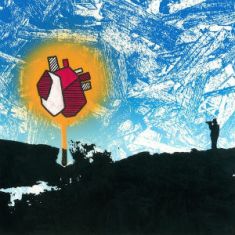Mancunian piano trio GoGo Penguin have just been nominated for a Mercury this year for their album v2.0 (Gondwana).
The New Melodicists pianist Chris Illingworth (above, centre), bassist Nick Blacka and drummer Rob Turner had debuted with Fanfares and had been widely compared to EST. There’s a certain melancholia in the band’s sound retained that is still appealing, and a certain enhanced karmic side to their interplay where you can measure the emotional impact at certain points. ‘Fort’ simplifies and clarifies the sound while protest song ‘One Percent’ has an eerie beginning that smashes hard, and ‘Home’ introduces new timbres, the drums more metallic. It’s a tuneful album, Halifax-born Illingworth a versatile and subtle kind of virtuoso who knows how to harness the energy and lost-in-the-music abandon of a 1990s dance music generation evident in the band’s interior soundtrack with Aphex Twin and Massive Attack influences peeking through. ‘The Letter’ was recorded in the dark apparently, a technique also deployed by another New Melodic band Phronesis, yet GoGo Penguin rely less on the delayed gratification of metrical exploration than the Anglo-Scandinavian trio whose latest album Life to Everything hits three weeks after v2.0. ‘To Drown in You’ has lots of surprise detonations, jabbing drums, and rhapsodic effects, with ‘Shock and Awe’ and ‘Hopopono’ drawing an album that could easily stake its claim as the most original and accessible jazz piano trio album of new music to emerge from these shores since the Neil Cowley 2006 album Displaced, to a convincing close.
In a great year for jazz Polar Bear have also been nominated for In Each and Every One (Leaf). A band that continues to grow and one that changed dramatically when electronicist Leafcutter John came on board to join drummer bandleader/composer Seb Rochford, bassist Tom Herbert, and saxophonists Pete Wareham and Mark Lockheart, for 2005’s breakthrough Mercury nominated Babel album Held on the Tips of Fingers (very different from the earlier exploratory Dim Lit), and who provides so much magpie sonic input to this record from his veritable magic lantern of a laptop and effects. He’s there combining with leader Seb Rochford’s compositional vision on the off beats of ‘Be Free’ with that head bobbingly dubby feel, a soft voice off, Rochford's whippy drum beats and the odd detonations saxophonists Lockheart and Wareham warily respond to at first who then open up on them, inspired. The oddly-titled ‘Chotpot’, next, Rochford’s clashingly visceral Afrobeat sensibility showing its face winningly and the band bounces up a dancefloor momentum which is just as infectious, that restless edgy side that can appeal to both jazz fans aware of the sometimes hidden improvisational ethic inherent and an electronica fanbase attuned to more tech-laden effects. Rochford has also learnt a lot from the late Steve Reid and in a Reid sense In Each and Every One for important stretches is a groove record (the saxophone players are like the commentators adding clarity and decoration to the brilliantly intuitive rhythms) particularly in the early part.

The cover of In Each and Every One
Leafcutter John gives the sound its beyond-jazz appeal and there’s still the textural soundscape side there in his style but also a connection with a post-dubstep world that would better be equipped to make more sense of Polar Bear than a lot of jazz made today. Few of the tunes are as strong, in a simply catchy sense, as the title track of 2010's Peepers, although ‘Lost in Death Part 2’ comes close with an English pastoral sense emerging melodically that connects more with the band’s early days. In Each and Every One has more depth and interest than Peepers from a compositional standpoint and the album keeps you guessing even after repeated plays. ‘WW’ has drama and a swirling anarchic sense to it that melds into an involving improvisation combined with creative studio effects. It also shows the artistic risks the band continue to take and mostly pull off, while ‘Maliana’ has a perky triangle-like interlocking Terry Riley-esque upper percussion-line aspect to it plus brassy brushstrokes and much else fascinating murk. Towards the end the record digs deeper into savant electronica territory, crackles and all, on ‘Life and Life’ and the melancholia and piercing drama ultimately of the saxophone melody is remarkable while ‘Two Storms’ at the end has a slightly withdrawn feel, the saxophone line just going up the scale and the ascending tympani-like lobbing in of tonal bass-y effects along for the ride on a stimulating record, Polar Bear's best to date.
Stephen Graham
Other jazz artists who were in the running this year
